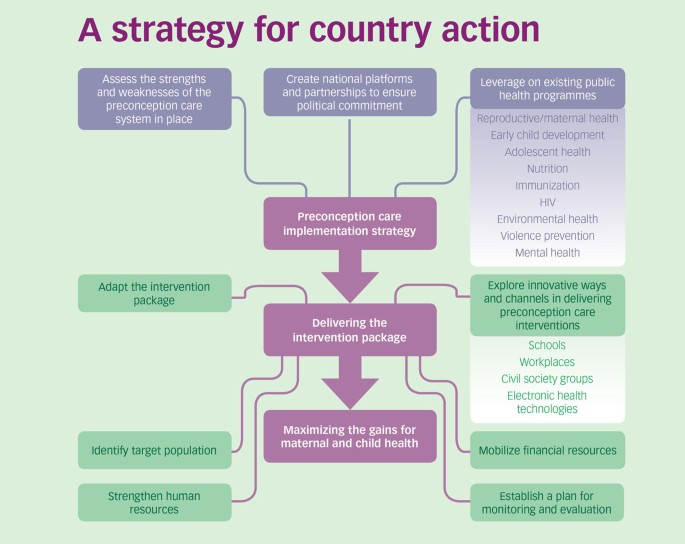The acceptance, application and full realization of the benefits – both in terms of health outcomes and cost savings – of preconception care programmes both nationally and internationally, will depend on the contributions of many individuals, groups and institutions. Local, national, regional and global actions are necessary to improve the availability of and access to preconception care interventions.
At the national level, governments will need to adopt an informed national strategy to put in place sustainable preconception care programmes (Figure 2).

Countries are at different stages in their current application of preconception care interventions. They also face different socio-cultural and economic contexts in which preconception care programmes are happening or will happen. In regions and countries where adolescent pregnancy rates are high, and early marriage common, preconception care will overlap with adolescent health programmes and projects. For example, in South East Asian expert group consultation on preconception care (New Delhi, India, August 2013) it was agreed that pre-conception care be introduced in two streams – one with a primary focus on reducing maternal and newborn mortality and morbidity, and the other with a focus on enabling older children and adolescents to make healthy transitions into adulthood.
While there are differences between and within countries, there are also similarities. Global and regional platforms for experience and expertise sharing may therefore be a useful way to accelerate knowledge transfer and mutual support between countries. WHO and international partners may play an important role in facilitating such platforms.
Ministries of Health will need support that goes beyond information exchange. They will need support to assess the situation, to short list priority interventions, to identify whom to deliver them to, to define how to deliver them, and to consider what it will take and cost to do so. And they will need support to translate this vision into a realistic plan and budget, and support to finance, implement and monitor implementation.
WHO is also committed to support countries to:
-
Create regional/national platforms and partnerships to advance preconception care interventions.
-
Introduce professionals in countries to international experience, research, evidence and good practices.
-
Analyze and understand the strengths and weaknesses of the preconception care system in place, and opportunities for improvement.
-
Explore various delivery strategies for preconception care interventions, and their comparative advantages in terms of coverage, feasibility, acceptability and cost.
-
Adapt the package of preconception care interventions to regional and country priorities, and health systems contexts.
-
Explore and document innovative ways to deliver preconception care outside the traditional maternal and child health programmes, while recognizing the importance of integrated delivery mechanisms.
Leveraging on existing alliances will accelerate success. For example, the global alliance that has been forged to support countries in achieving the MDG 4 and 5 targets can play an important role in engaging policy makers and planners in dialogue, in stimulating and supporting learning by doing, and in documenting, evaluating and sharing country experiences. Partnering with the NCD community is very important, given the high profile of the NCDs in global health agenda and governments’ commitment to address NCDs within an explicit monitoring framework. The “Draft action plan for the prevention and control of noncommunicable diseases 2013–2020” which was discussed at the 66th World Health Assembly in May 2013, recognizes preconception care, as part of the national policy framework, as an important contributor to noncommunicable disease prevention and control [25].
We have achieved a global consensus that preconception care is important to do and can be done. We must now set our sights on the objective: Preconception care is being done, is being done well, and is making a difference.
